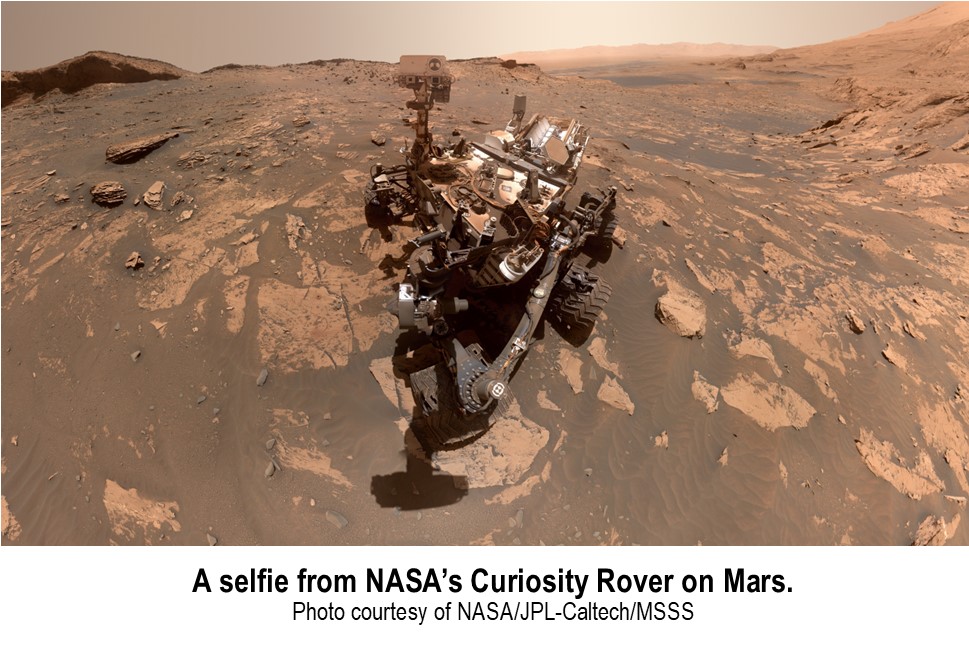As kind of a science fiction nerd, I have an innate attraction to outer space. When I was a kid, the movie 2001: A Space Odyssey was released. This film revolutionized how technology and computer graphics would be used in making movies, spurring the imagination of young and old alike. Today, NASA has an active mission on Mars exploring the surface and geology of the Red Planet. And the name of the mission?
You guessed it—Curiosity.
It is human nature to explore, to follow our curiosity further and further. For any parent of a two-year-old knows their favorite question is “why?” Our minds are made to wander and to wonder. This play on words is part of the Christmas carol, “I Wonder as I Wander.” The two activities do seem connected, don’t they? We humans wonder about our lives, our world, our being. And we are prone to wander, to move about, searching and learning new things and new places, now to the Red Planet, which 100 years ago was only science fiction.
We are Made to Learn
Curiosity is a good quality about being human. We are made to learn, to want to know more about ourselves and the world around us. This leads us to push back the limits of our knowledge today in pursuit of more and more insights tomorrow.
In seventh grade I did a project for the science fair. I was interested in ecology. So, I had seven Ball jars filled with water. One was just water. The others had a mix of water, plants and snails. The last jar was just snails. The goal was to learn about the balance of oxygen needed for plants and animals in these microenvironments. By the end of the experiment, the jar containing only snails was gross and disgusting. Worse, all the snails had died. The jar that had a balance of snails and plants was crystal clear. The rest of the jars were somewhere in between. Oxygen from the plants supported the snails. Nitrogen and carbon dioxide from the snails nourished the plants. I didn’t get the blue ribbon, but my curiosity piqued. Interestingly I ended up digging deeper into the study of conservation and ecology with an internship in college at a national park.
Lifelong Curiosity to Learn
We don’t get less curious as we age. Contrary to social prejudices against aging, humans have a lifelong curiosity, and a drive to learn. Psychologist Eric Erickson described ages of life. The final stage he called “integration.” In our latter years we begin to knit all we have learned and experienced into patterns of meaning. Our minds and spirits achieve a depth of understanding in which we can appreciate the trials and adversity that we have overcome. We acknowledge mistakes and lessons learned along the way and we come to deeper relationships with those we love. Of course, it doesn’t always work this way for everyone, for a variety of reasons, mostly bad. But, it is part of the inner design of our humanity, Erikson says.
At United Church Homes, we are committed to being a learning organization. We provide opportunities for our residents to continue learning, exploring and developing new skills and interests. Our residents have told us that they want more of these experiences, not fewer! They also want to continue to make a difference, to engage with issues of the day. Knowing a thing or two, we have lots of wisdom in our midst to learn from. Many multiple lifetimes of learning with an innate desire for more.
Rejecting Mistaken Ways of Thinking
Curiosity does have a dark side too. The adage that “curiosity killed the cat,” is common in our language heritage. People have been curious and pursued darker aims that have led to eugenics, a racially distorted philosophy that supported the Holocaust and the relocation of indigenous people in the American territories. Mistakenly called the “Doctrine of Discovery,” this led white leaders to send explorers into the west to colonize, Christianize and force Native peoples to move west to barren lands in Oklahoma and other places. We have only recently learned to repudiate these mistaken practices and ways of thinking. As such, some groups have begun thinking about how to right these wrongs from the past and create some kind of reconciliation, if possible. We change our thinking; we overrule our mistaken beliefs and we overcome our learned prejudices.
It’s more than okay to be curious. If we are honest, we really don’t need permission to be curious at all. We open our minds to the vastness of God’s creation and know that more light is yet to be revealed, as the Reformers proclaimed. Or as today’s United Church of Christ says, “God is still speaking.”
While we won’t be sending missions to Mars, United Church Homes has much more to learn even after more than 100 years of ministry. We are curious as an organization about how best to serve more people in more places and in new ways. For we believe there is so much more to learn about aging and how older adults want to be served, both within our campus communities and in the places they call home.
For Reflection (either individually or with a group)
Read the blog. Read it a second time, maybe reading it aloud or asking someone else to read it aloud so you can hear it with different intonation and emphases. Then spend some time with the following questions as you think about floating among the stars or visiting. Mars.
- About what subject or topic are you most curious (nature, faith, the arts, inventions, science, history, ethics, etc.)?
- What would you say is the most fundamental question about that topic that you would like answered?
- Where could you go or who do you know who might be able to answer the question and give you some additional information about that topic?
Download a pdf including the Reflection Questions to share and discuss with friends, family, or members of your faith community small group.
View all articles by:






















